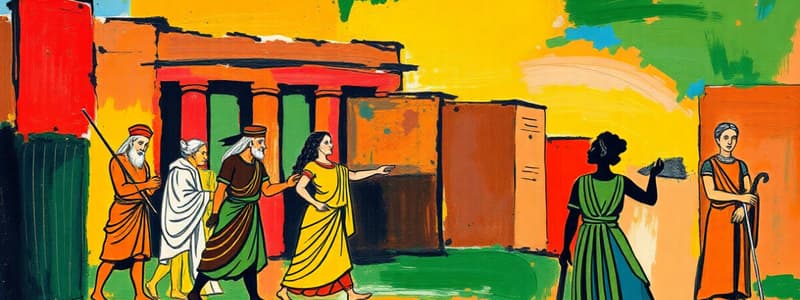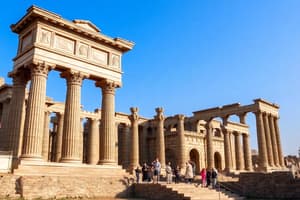Podcast
Questions and Answers
What aspect of historical study emphasizes the impact of revolutions and political systems?
What aspect of historical study emphasizes the impact of revolutions and political systems?
- Political change (correct)
- Cultural development
- Economic development
- Technological advancement
Which key theme encompasses the growth of trade and industry?
Which key theme encompasses the growth of trade and industry?
- Social change
- Economic development (correct)
- Global interactions
- Cultural development
Which theme focuses on the evolution of art, culture, and philosophy?
Which theme focuses on the evolution of art, culture, and philosophy?
- Cultural development (correct)
- Political change
- Social change
- Technological advancement
Why is context important in historical narratives?
Why is context important in historical narratives?
Which theme examines innovations in areas like transportation and communication?
Which theme examines innovations in areas like transportation and communication?
What is a key feature of early civilizations?
What is a key feature of early civilizations?
Which of the following periods is characterized by feudalism?
Which of the following periods is characterized by feudalism?
What did the Renaissance emphasize in Europe?
What did the Renaissance emphasize in Europe?
What is the Columbian Exchange primarily associated with?
What is the Columbian Exchange primarily associated with?
Which historical methodology involves the study of different social groups within a historical context?
Which historical methodology involves the study of different social groups within a historical context?
What was a significant impact of Ancient Greece and Rome on Western civilization?
What was a significant impact of Ancient Greece and Rome on Western civilization?
During which period did the emphasis on reason, individualism, and liberty become prominent?
During which period did the emphasis on reason, individualism, and liberty become prominent?
What defines primary sources in historical research?
What defines primary sources in historical research?
Flashcards
Technological Advancement
Technological Advancement
The development of new technologies, like transportation, communication, and medicine, throughout history.
History as a Narrative
History as a Narrative
Historians create stories about the past, but these are not objective recordings. They choose what to focus on, and how to interpret evidence.
Political Change
Political Change
Changes in political systems, empires, and revolutions throughout time.
Economic Development
Economic Development
Signup and view all the flashcards
Social Change
Social Change
Signup and view all the flashcards
Early Civilizations
Early Civilizations
Signup and view all the flashcards
Ancient Greece and Rome
Ancient Greece and Rome
Signup and view all the flashcards
Medieval Period
Medieval Period
Signup and view all the flashcards
Renaissance
Renaissance
Signup and view all the flashcards
Age of Exploration and Colonization
Age of Exploration and Colonization
Signup and view all the flashcards
The Enlightenment
The Enlightenment
Signup and view all the flashcards
Primary Sources
Primary Sources
Signup and view all the flashcards
Secondary Sources
Secondary Sources
Signup and view all the flashcards
Study Notes
Historical Eras and Periods
- History encompasses all past events from early civilizations to the present.
- It's a complex narrative of interconnected societies, cultures, and individuals.
- Understanding historical events helps us understand the present and anticipate potential future outcomes.
Key Historical Periods
- Early Civilizations: Development of agriculture, writing systems, and complex social structures in societies like ancient Egypt, Mesopotamia, Indus Valley, and others. Key features include advancements in governance, architecture, and cultural expression.
- Ancient Greece and Rome: Significant impacts on Western thought, philosophy, art, and law, focusing on political systems like democracy and republic, advancements in philosophy and science, and military and infrastructure development.
- Medieval Period: Characterized by feudalism, the rise of Christianity, and the Crusades. Development of universities, religious orders, and significant architectural innovations like Gothic cathedrals.
- Renaissance: A period of artistic and intellectual rebirth in Europe, focusing on humanism, classical learning, and innovations in the arts and sciences, marked by advancements in painting, sculpting, and literature.
- Age of Exploration and Colonization: European voyages of discovery and colonization impacting numerous regions globally, with the Columbian Exchange as a key example of interaction. Driven by exploration, economic expansion, and the spread of European cultures and influence.
- The Enlightenment: Emphasis on reason, individualism, and liberty, developing new philosophical and political ideas that influenced subsequent revolutions and reforms.
Historical Methodologies
- Historians use various methods to investigate and interpret the past.
- Primary sources: Original documents, artifacts, and materials from the studied time period.
- Secondary sources: Analyses and interpretations of primary sources written by historians.
- Historical criticism: Examining sources for accuracy, biases, and context.
- Comparative history: Studying similarities and differences across societies and time periods.
- Social history: Examining experiences of different social groups and classes within a specific historical context.
- Cultural history: Examining the values, beliefs, and practices of a particular culture or society.
Key Themes
- Political change: The rise and fall of empires, revolutions, and political systems.
- Economic development: Growth of trade, industry, capitalism, and economic crises.
- Social change: Shifts in social structures, class relations, and gender roles.
- Cultural development: Evolution of art, culture, philosophy, and religion.
- Technological advancement: Innovations in transportation, communication, and medicine.
- Global interactions: Increasing connections and exchanges among different parts of the world.
Historical Narratives
- Histories are constructed narratives, not objective recordings of the past.
- Historians select focus areas and interpret evidence.
- Different perspectives and biases can lead to varied interpretations of a single event.
- Context is essential; an event's meaning is impacted by its time and place.
Studying That Suits You
Use AI to generate personalized quizzes and flashcards to suit your learning preferences.




